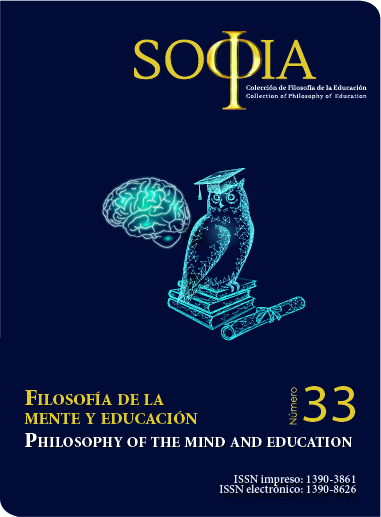What happens inside my head when I think? Un análisis de las representaciones de los niños a través del dibujo.
Main Article Content
Abstract
Article Details

This work is licensed under a Creative Commons Attribution-NonCommercial-ShareAlike 4.0 International License.
Authorship: The list of authors signing must include only those people who have contributed intellectually to the development of the work. Collaboration in the collection of data is not, by itself, a sufficient criterion of authorship. "Sophia" declines any responsibility for possible conflicts arising from the authorship of the works that are published.
Copyright: The Salesian Polytechnic University preserves the copyrights of the published articles, and favors and allows their reuse under the Creative Commons Attribution-NonCommercial-ShareAlike 3.0 Ecuador license. They may be copied, used, disseminated, transmitted and publicly displayed, provided that: i) the authorship and the original source of their publication (journal, editorial and work URL) are cited; (Ii) are not used for commercial purposes; Iii) mention the existence and specifications of this license.
References
BATISTELLA, Andreia Fortunato; Eliane Paganine da Silva & Ligiane Gomes
A noção de vida em crianças brasileiras em 2004 em comparação com as de Genebra em 1926. Ciências e Cognição, 04, 61-72.
BEC, Jean-Louis & Daniel Favre
Le système nerveux dans le programme de biologie: quel(s) concept(s) veut-on enseigner? Trema, 9-10, 97-104.
BERNACHE, Fabián
La función explicativa de la noción de representación interna. Sophia: Colección de Filosofía de la Educación, 31, pp. 265-290.
CAREY, Susan; Deborah Zaitchik & Igor Bascandziev
Theories of development: In dialog with Piaget. Developmental Review, 38, 36-54. https://doi.org/10.1016/j.dr.2015.07.003
CLÉMENT, Pierre
La biologie et sa didactique, dix ans de recherche. Aster, 27, 57-93.
CLÉMENT, Pierre; Lassaad Mouelhi & Mondher Abrougui
Héréditarisme, béhaviorisme, constructivisme: Le système nerveux dans les manuels scolaires français et tunisiens. Aster, 42, 187 – 222.
DELVAL, Juan
Introdução à prática do método clínico: descobrindo o pensamento das crianças. Porto Alegre: Artmed.
EINARSDOTTIR, Johanna; Sue Dockett & Bob Perry
Making meaning: children’s perspectives expressed through drawings. Early Child Development and Care, 179 (2), 217-232. https://doi.org/10.1080/03004430802666999
EPSTEIN, Herman Theodor
a Phrenoblysis: Special Brain and Mind Growth Periods. I. Human Brain and Skull Development. Developmental Psychobiology, Waltham, Massachusetts, 7(3), 207-216. https://doi.org/10.1002/dev.420070304
b Phrenoblysis: Special Brain and Mind Growth Periods. II. Human Mental Development. Developmental Psychobiology, Waltham, Massachusetts, 7(3), 217-224. http://doi.org/10.1002/dev.420070305
FUENTES, Adela & Javier Collado
Fundamentos epistemológicos transdiciplinares de educación y neurociencia. Sophia: Colección de Filosofia de la Educación, 26 (1), 83 – 113.
GIORDAN, André & Gérard de Vecchi
As origens do saber: das concepções dos aprendentes aos conceitos científicos. Porto Alegre: Artes Médicas.
HAMELINE, Daniel & Jacques Vonèche.
Jean Piaget: agir et construire, chez l’enfant et le savant. Genebra: Editions FAPSE.
HANSEN, Linda & Martin Monk
Brain development, structuring of learning and Science education: where are we now? A review of some recent research. International Journal of Science Education, 24 (4), 343-356. https://doi.org/10.1080/09500690110049105
HUDSPETH, William J. & Karl H. Pribram
Stages of brain and cognitive maturation. Journal of Educational Psychology, 82 (4), 881-884. https://doi.org/10.1037/0022-0663.82.4.881
JIMÉNEZ, Juan de Dios; Rafael Hoces Prieto & Francisco Javier Perales
Análises de los modelos y los grafismos utilizados en los libros de texto. Alambique : Didáctica de las Ciencias Experimentales Barcelona, 11, 75-85.
JOU, Graciela Inchausti de & Tania Mara Sperb
Teorias da mente: diferentes abordagens. Psicologia: Reflexão & Crítica, 12 (2), 287 – 306.
LISBOA, Felipe Stephan & Rafaela Teixeira Zorzanelli
Metáforas do cérebro: uma reflexão sobre as representações do cérebro humano na contemporaneidade. Physis - Revista de saúde coletiva, 24 (2), 363-379. https://doi.org/10.1590/S0103-73312014000200003
MARTINS, Taís Oliveira & Marcelo Leandro Eichler
Neurociências cognitivas no estudo do sistema nervoso: um olhar crítico por meio do livro didático de educação básica. IENCI: Investigações em ensino de Ciências, 25(2), 272-292. https://doi.org/10.22600/1518-8795.ienci2020v25n2p272
MEIN, Marie-Thérèse
Les representations du cerveau: modeles historiques. Aster, 7, 185 – 204.
MOLINATTI, Grégoire & Yves Girault.
La médiation muséale des neurosciences : quatre expositions récentes sur le cerveau. Culture & Musées, 10, 97-123. https://doi.org/10.3406/pumus.2007.1442
MONTANGERO, Jacques & Danielle Maurice-Naville
Piaget ou a Inteligência em Evolução. ArtMed: Porto Alegre.
MOUNOUD, Pierre.
Perspective taking and belief attribution: From Piaget’s theory to children’s theory of mind. Swiss Journal of Psychology, 55 (2/3), 93-103.
Coordination des points de vue et attribution de croyances: de la théorie de Piaget aux théories "naïves" de l'esprit. Psychologie française, 42 (1), 31-43.
PIAGET, Jean
A representação do mundo na criança. Aparecida (SP): Ideias e Letras.
RABELLO, Silvia Helena dos Santos
A criança, seu corpo, suas ideias. Ensino em Re-vista, Uberlândia, 3 (1), 15-29.
REITH, Emiel
Quand les psychologues étudient le dessin… Mei: Médiation et Information, 7, 130-151.
RICHELLE, Marc
L’esprit piagétien et le renouveau de l’esprit. In: Olivier Houdé; Claire Meljac (Orgs.). L'esprit piagétien: Hommage international à Jean Piaget. Paris: Presses Universitaires de France, 223-236.
ROAZZI, Antonio
Pesquisa e contexto: Métodos de investigação e diferenças sócio-culturais em questão. Cadernos de Pesquisa, (62): 35-44.
TILLERÍA, Leopoldo.
La filosofía de la mente de Jerry Fodor. Sophia: Colección de Filosofía de la Educación, 30, 155-177. https://doi.org/10.17163/soph.n30.2021.05
SAADA, Madelon; Alex Blanchet; Roland Pasquier & Emiel Reith
Qu’est cequi se passe dans ma tetê quand je pense? In: D. Hameline; J. Vonèche (Orgs.) Jean Piaget: agir et construire, chez l’enfant et le savant. Genebra: Editions FAPSE, 87-106.
VALSINER, Jaan
Constructive curiosity of the human mind: Participating in Piaget. In Jean Piaget. The child’s conception of physical causality. New Brunswick (NJ): Transaction Publishers.
WELLMANN, Henry M.
The development of theory of mind: Historical reflections. Child Development Perspectives, 11 (13), 207 -214. https://doi.org/10.1111/cdep.12236

